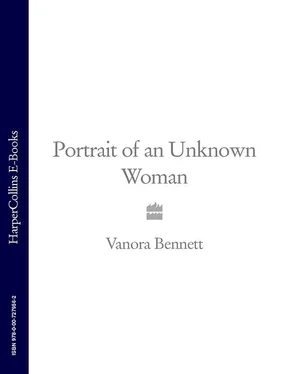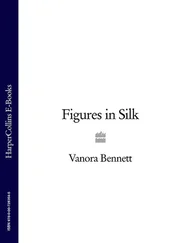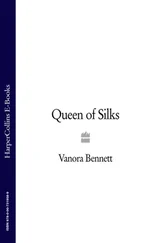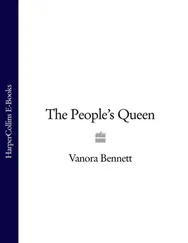It was the garden that kept drawing everyone out, and the river beyond the gate. Not our stretch of wild water, which the locals said danced to the sound of drowned fiddles and which was notoriously hard to navigate and moor from. Not the little boats that villagers used to go after salmon and carp and perch. Not the view of the gentle far shore, where the Surrey woods with their wild duck and waterfowl stretched back to the hills of Clapham and Sydenham. But the ribbon of river you could see from Father’s favourite part of the garden, the raised area which gave the best possible view of London – the rooftops and the smoke and the church spires – which used to be our home until we got quite so rich and powerful, and which he, almost as much as I, couldn’t bear to pass a day without seeing.
First Margaret and Will Roper came out, arm in arm, decorous, stately, married, learned, modest, handsome and happy, seeming to me, on that scratchy morning, unbearably smug. Margaret, the oldest of the More children and my adopted sister, was twenty-two like her husband, a bit more than a year younger than me; but they were already so long settled in their shared happiness that they’d forgotten what it was to be alone. Then Cecily with her new husband, Giles Heron, and Elizabeth with hers, William Dauncey, all four younger than me, Elizabeth only eighteen, and all smirking with the secret pleasure of newlyweds, not to mention the more obvious pleasure of those who had had the good fortune to make advantageous marriages to their childhood sweethearts and find their new husbands’ careers being advanced by regular trips to court and introductions to the great and good. Then Grandfather, old Sir John More, puffed up and dignified in a fur-trimmed cape (he’d reached the age where he worried about chills in the spring air). And young John, the youngest of the four More children, shivering in his undershirt, so busy peering upriver that he started absentmindedly pulling leaves off a rose bush and scrunching them into tiny folds until Dame Alice materialised next to him, scolded him roundly for being destructive, and sent him off to wrap up more warmly against the river breezes. Then Anne Cresacre, another ward like me, managing, in her irritating way, to look artlessly pretty as she arranged her fifteen-year-old self and a piece of embroidery near John. In my view there was no need for all the draping of her long limbs and soft humming in her tuneful voice and that gentle smiling with her lovely little face that she did whenever John was around. It was obvious. With all the money and estates she’d been left by her parents, Father would have John marry her the day she came of age. What would be the point of bringing up a rich ward otherwise? Of all his wards, it was only me he seemed to have forgotten to marry off, but then I was several years too old to marry his only son.) Anne Cresacre didn’t need to try half so hard. Especially since you could see from the doggy way John looked at her that, even if he wasn’t very clever, he knew enough to know that he’d been in love with her all his life.
The sun came out on young John’s face as he came back, better dressed now for the gusty weather, and he screwed up his eyes painfully against the harshness of the light. And suddenly the peevish ill-temper that had been with me through a winter of other people’s celebrations – a joint bride-ale for Cecily and Elizabeth and their husbands, followed by Christmas celebrations for our whole newly extended family – seemed to pass, and I felt a pang of sympathy for the newly man-height boy. ‘Have you got your headache again?’ I asked him in a whisper. He nodded, trying like me not to draw anyone’s attention to my question. His head ached all the time; his eyes weren’t strong enough for the studying that made up so much of our time, and he was always anxious that he wasn’t going to perform well enough to please Father or impress pretty Anne, which only made it worse. I put a hand through his skinny arm and drew him away down the path to where we’d planted the vervain the previous spring. We both knew it helped with his headaches, but the clump that had survived was still woody and wintry. ‘There’s some dried stuff in the pantry,’ I whispered. ‘I’ll make you a garland when we get back to the house, and you can lie down with it for a while after dinner.’ He didn’t say anything, but I could sense his gratitude from the way he squeezed my hand against his bony ribs.
One moment of kindness reassured him; and it was enough to add honey to my view of everything too. When Dame Alice came back from her own spontaneous little stroll in the garden, rejoining the crowd gathered as if by chance and staring towards the spire of St Paul’s, I was touched to see our stepmother – Father’s second wife, who’d married him just before I’d come to the house, and looked after his four children and the wards he’d taken on, as sensibly and lovingly as if they’d been her own – had been quietly taking trouble with her hair. She always laughed robustly but she didn’t like it when Father teased her about the size of her nose. Her great beauty was her beautiful broad forehead, and now she’d brushed her hair – with its stray streaks of grey blackened with the elderberry potion she liked me to make for her – back off it to show the unlined, luminous skin at its best.
Father’s teasing could be cruel. Even Anne Cresacre, who had nerves of steel, wept with frustration over the box he gave her for her fifteenth birthday. She thought it would contain the pearl necklace she’d been asking for for so long. But it turned out there was nothing in it but a string of peas. ‘We must not look to go to Heaven at our pleasure or on feather beds,’ was his only comment, along with that quizzical, birdlike look from far away that reminded you he wore a hair shirt under his robes and wouldn’t drink anything but water. At least she had enough presence of mind to overcome her disappointment and say to him at dinner, as prettily as ever, ‘That is so good a lesson that I’ll never forget it,’ and win one of those sudden golden smiles of his that always made you forget your fury and be ready to do anything for him again. So that time it came out all right, and anyway Anne Cresacre could look after herself. But I thought he should be kinder to his own wife.
Dame Alice could do what she liked to her hair on this day, anyway. Father was the only one who wasn’t here. He was away somewhere, like he always was since we’d moved to Chelsea. Court affairs; the King’s business. I lost count of what and where. Even when he reappeared, looking tired, with the new gold spurs that he didn’t really know what to do with clinking uselessly against a horse’s muddy sides, and we all rushed out to see him, he just shut himself away in the private place he’d built in the garden – his New Building, his monk’s cell – and prayed, and scourged himself, and fasted. We hardly knew him any more. But I had heard him promise Dame Alice when he last set off that he’d be back as soon as the painter arrived. And I happened to see that morning that she’d laid out some of his grandest clothes – the glistening fur-lined black cape, the doublet with the long, gathered sleeves of lustrous velvet attached that were long enough to hide the hands whose coarseness secretly embarrassed him. He liked to believe he just wanted his portrait painted to return likenesses of himself to his learned friends in Europe, who were always sending him their pictures. But being painted in those clothes spoke of something more. Even in him, worldly vanity couldn’t quite be extinguished.
And so our eyes devoured the river. I could almost feel the pull of everyone’s waiting and wishing. Longing to display ourselves to Hans Holbein, the young man sent to us from Basel by Erasmus – a living token of the old scholar’s continuing affection for us, long after he stopped living with us and went back to his books abroad – in memory of the good old days when Father’s friends were men of the mind, instead of the spare-faced bishops whose company he’d come to prefer these days. In those times ideas were still games, and the worst argument you could imagine was Father’s with Erasmus over what he should call the book he was writing about an imaginary nowhere land (which had ended up being as much of a best-seller as any of Erasmus’ works). We were longing to show ourselves as the accomplished, educated graduates of an experimental family school that Erasmus had always, in his almost embarrassingly flattering and charming way, praised to the heavens all around Europe as Plato’s Academy in its modern image. And longing to be back, at least on canvas, in a time when we were all together.
Читать дальше












